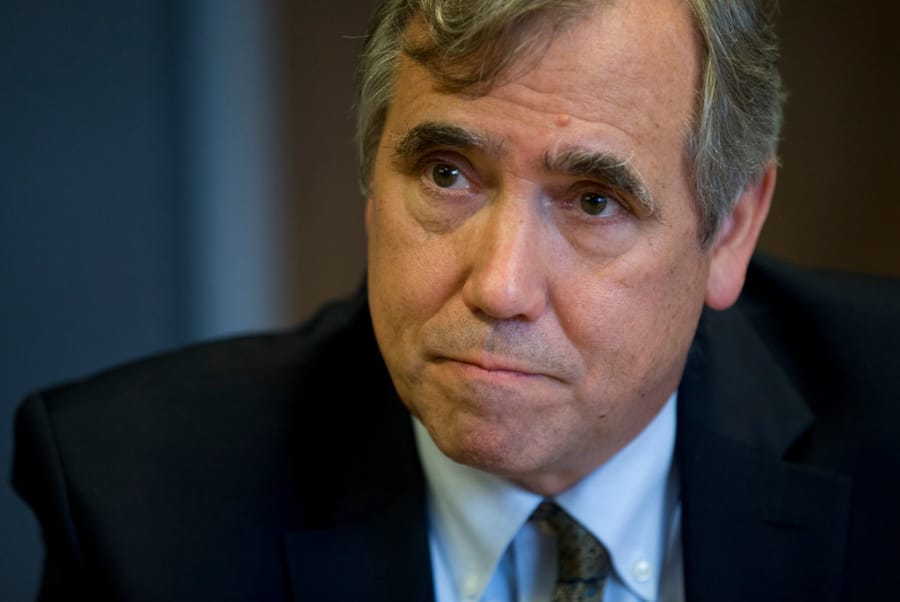NEW YORK — Sen. Jeff Merkley once shadowed a cannabis grower and dispenser as he tried to pay his state taxes. He stuffed a backpack with $70,000 in $20 bills and drove 50 miles — unguarded — with the bulging bag in the back seat. Once he arrived at the Oregon Department of Revenue, he went through multiple rounds of security to deposit his satchel in a room packed with guards looking after the millions of dollars pouring in from other cannabis companies.
Merkley, a Democrat from Oregon, likes to recount the story to show the lunacy of the federal government’s treatment of the cannabis industry. Legal sales exceeded $10 billion in 2018, the annual Marijuana Business Factbook reported, and are expected to hit $80 billion by 2030, according to research firm Cowen Inc. Yet the substance remains illegal on a national level, so banks must forego a lucrative revenue stream — or risk prosecution or the loss of their charter.
Operating a business in cash isn’t just inconvenient. It also leaves thousands of growers, retailers and employees vulnerable to crime and handicaps growing businesses. Banks can’t accept cash deposits, process credit card payments, clear checks, make loans or underwrite stocks and bonds, even though tax authorities have figured out workarounds. Like Oregon, the Internal Revenue Service has built “cash rooms” to receive federal taxes paid by marijuana companies, Treasury Secretary Steven Mnuchin said in April.
The door to a solution may finally be opening. On Monday, Rodney Hood, the chairman of the National Credit Union Administration, said his agency won’t punish federally chartered credit unions for working with cannabis companies in states where marijuana is legal. Credit unions still must follow anti-money-laundering and other banking laws. Some state-regulated credit unions have already been providing banking services to pot companies, but often charge higher prices because of the extra paperwork and risks involved.
Credit unions, though, are only a partial answer. A new regulator could easily reverse Hood’s policy. “The crux of it is that it’s still illegal,” said Joanne Sherwood, the chief executive officer of Colorado’s Citywide Banks and chair of the Colorado Bankers Association. “We need to make cannabis legal or we need” a federal law to clarify the rules for banks, she said.
A growing number of U.S. lawmakers from both parties are trying to do just that. A House measure that would protect financial institutions that serve cannabis businesses now has 206 co-sponsors and is teed up for a floor vote in the fall.
But perhaps the biggest breakthrough came on July 23 at a Senate Banking Committee hearing. Its Republican chairman, Idaho Sen. Mike Crapo, for years refused to even discuss letting banks serve the cannabis industry. So it was a surprise when he agreed to use his committee as a platform to consider ways around the cash conundrum.
That’s when Merkley told his story and explained how legislation he is proposing, the Secure and Fair Enforcement Banking Act, would help. His measure would provide a safe harbor for banks by barring federal law enforcement and regulatory agencies from punishing banks for working directly or indirectly with cannabis-derived cash.
Merkley’s tale dates back to 2016. Since then, the federal-state conflict has only gotten worse: Marijuana is now legal for recreational use in 11 states and allowed for medicinal use in another 22. More than half of Americans live in those 33 states.
Idaho isn’t among them. It hasn’t legalized pot for recreational or medicinal use. And Crapo for years has publicly resisted greenlighting financial industry involvement. Just in April he said it would be “difficult” as long as cannabis is illegal under federal law.
Behind the scenes, though, the pressure for him to reconsider has been mounting. Earlier this year, the Idaho Bankers Association began talking to the senator about the issue for the first time. When Trent Wright, the group’s chief executive officer, asked Crapo to hold a hearing, he was surprised when the answer was yes.
Meanwhile, a consensus has been building among other senators, Wright said. Colorado Republican Cory Gardner, whose state pioneered liberalization of marijuana laws and who is co-sponsoring the SAFE Banking legislation, might have been especially persuasive. “I have spoken many times with Senator Gardner on this bill,” Crapo said at the hearing.
National associations have also been weighing in, according to James Ballentine, the executive vice president of congressional relations at the American Bankers Association. Lately, Ballentine has sensed a change in the air. “When Crapo started looking at this issue five to six years ago, there weren’t 33 states that had legalized marijuana in some form,” he said. “I’m sure he’s now been hearing quite a bit on this issue, and I think the groundswell of input” persuaded him to take a deeper look.




